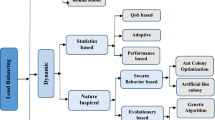Abstract
List-based workflow scheduling has received much research attention and been implemented in many existing workflow computing systems as more and more scientific and engineering applications need to exploit task parallelism for performance improvement. In this paper, we propose two task-ranking mechanisms and one task allocation method for the two major steps in list-based workflow scheduling. The proposed task-ranking approaches are based on innovative ideas of remaining workload and hybrid ranking, in contrast to the single path-oriented concept widely used in existing methods. The investigation of task allocation points out an important aspect, amount of available resources, which was not considered seriously in previous research. The proposed approaches were evaluated extensively with a series of simulation experiments and compared to existing widely used task-ranking and allocation methods. The experimental results show that our approaches has potential to outperform existing methods significantly in many cases, but no one single method can always achieve the best performance, which indicates a promising direction for future research work.























Similar content being viewed by others
References
Bittencourt LF, Sakellariou R, Madeira ERM (2010) DAG scheduling using a lookahead variant of the heterogeneous earliest finish time algorithm. In: Proceedings of the 18th euromicro conference on parallel, distributed and network-based processing. pp 27–34
Gary MR, Johnson DS (1979) Computers and intractability: a guide to the theory of NP-Completeness. W.H. Freeman and Co., San Francisco
Bittencourt LF, Madeira ERM (2008) A performance-oriented adaptive scheduler for dependent tasks on grids. J Concurr Comput Pract Exp 20(9):1029–1049
ASKALON (2013) http://www.dps.uibk.ac.at/projects/teuta/. Accessed 20 oct 2013
DAGman (2013) http://research.cs.wisc.edu/htcondor/dagman/dagman.html. Accessed 20 oct 2013
Cloudbus (2013) http://www.cloudbus.org/workflow/. Accessed 20 oct 2013
Pegasus (2013) http://pegasus.isi.edu/. Accessed 20 oct 2013
Wieczorek M, Prodan R, Fahringer T (2005) Scheduling of scientific workflows in the askalon grid environment. ACM SIGMOD Record 34(3):56–62
Topcuoglu H, Hariri S, Wu MY (2002) Performance-effective and low-complexity task scheduling for heterogeneous computing. IEEE Trans Parallel Distrib Syst 2(13):247–260
Wieczorek M, Prodan R, Hoheisel A, Wieczorek M, Prodan R, Hoheisel A (2008) Taxonomies of the multi-criteria grid workflow scheduling problem. In: Grid middleware and services. pp 237–264
Mandal A, Kennedy K, Koelbel C, Marin G, Mellor-Crummey J, Liu B, Johnsson L (2005) Scheduling strategies for mapping application workflows onto the grid. In: Proceedings of the 14th IEEE symposium on high performance distributed computing. pp 125–134
Wu Z, Liu X, Ni Z, Yuan D, Yang Y (2013) A market-oriented hierarchical scheduling strategy in cloud workflow systems. J Supercomput 63(1):256–293
Javadi B, Thulasiraman P, Buyya R (2012) Enhancing genetic algorithms for dependent job scheduling in grid computing environments. J Supercomput 62(1):290–314
Deelman E, Singh G, Kesselman C (2005) Optimizing grid-based workflow execution. J Grid Comput 3(3):201–219
Falzon G, Li M (2012) Enhancing list scheduling heuristics for dependent job scheduling in grid computing environments. J Supercomput 59(1):104–130
Sih GC, Lee EA (1993) A compile-time scheduling heuristic for interconnection-constrained heterogeneous processor architectures. IEEE Trans Parallel Distrib Syst 4(2):175–186
EI-Rewini H, Lewis TG (1990) Scheduling parallel program tasks onto arbitrary target machines. J Parallel Distrib Comput 9(2):138–153
Kwok Y, Ahmad I (1996) Dynamic critical-path scheduling: an effective technique for allocating task graphs to multi-processors. IEEE Trans Parallel Distrib Syst 7(5):506–521
Hsu CH, Hsieh CW, Yang CT (2007) A generalized critical task anticipation technique for DAG scheduling. In: Proceedings of ICA3PP 2007. pp 493–505
Sinnen O (2007) Task Scheduling for Parallel Systems. John Wiley, New York
Kim SJ, Browne JC (1988) A general approach to mapping of parallel computation upon multiprocessor architectures. In: Proceedings of international conference on parallel processing. pp 1–8
Yang T, Gerasoulis A (1994) DSC: scheduling parallel tasks on an unbounded number of processors. IEEE Trans Parallel Distrib Syst 5(9):951–967
Liou J, Palis MA (1996) An efficient clustering heuristic for scheduling DAGs on multiprocessors. In: Proceedings of the 8th symposium on parallel and distributed processing
Bittencourt LF, Madeira ERM (2009) Towards the scheduling of multiple workflows on computational grids. J Grid Comput 1(8):419–441
Park G, Shirazi B, Marquis J (1997) DFRN: a new approach for duplication based scheduling for distributed memory multi-processor systems. In: Proceedings of international conference on parallel processing. pp 157–166
Zhao H, Sakellarious R (2006) Scheduling multiple DAGs onto heterogeneous systems. In: Proceedings of the 20th international conference on parallel and distributed processing
Yu Z, Shi W (2008) A planner-guided scheduling strategy for multiple workflow applications. In: Proceedings of the 37th international conference on parallel processing. pp 8–12
N’takpé T, Suter F (2007) A comparison of scheduling approaches for mixed-parallel applications on heterogeneous platforms. In: Proceedings of the 6th international symposium on parallel and distributed computing
Business Process Execution Language (BPEL) (2013) http://en.wikipedia.org/wiki/Business_Process_Execution_Language. Accessed 20 oct 2013
Cicerre FRL, Madeira ERM, Buzato LE (2006) A hierarchical process execution support for grid computing. J Concurr Comput Pract Exp 18(6):581–594
Ramakrishnan A, Singh G, Zhao H, Deelman E, Sakellariou R, Vahi K, Blackburn K, Meyers D, Samidi M (2007) Scheduling data-intensive workflows onto storage-constrained distributed resources. In: Proceedings of the seventh IEEE international symposium on cluster computing and the grid. pp 401–409
Acknowledgments
This paper is based upon work supported by National Science Council (NSC), Taiwan, under Grants No. NSC 101-2221-E-142 -002 -MY2.
Author information
Authors and Affiliations
Corresponding author
Rights and permissions
About this article
Cite this article
Huang, K.C., Tsai, Y.L. & Liu, H.C. Task ranking and allocation in list-based workflow scheduling on parallel computing platform. J Supercomput 71, 217–240 (2015). https://doi.org/10.1007/s11227-014-1294-7
Published:
Issue Date:
DOI: https://doi.org/10.1007/s11227-014-1294-7




